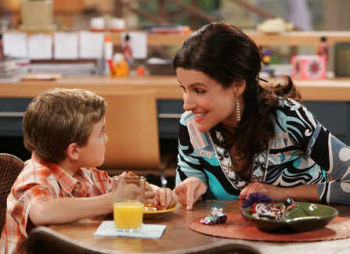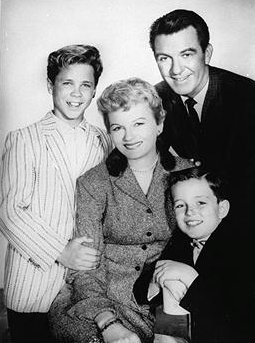Neoliberal Parenting and Television
By: Hector Amaya / Southwestern University
Last night I saw something strange on television. On the CBS show The New Adventures of Old Christine, I saw a father turn down a birthday card from his young son, who cannot be much older than nine. The show, starring Julia Louis-Dreyfus as Christine, is a sitcom that centers around Christine’s tribulations after her divorce from Richard (Clark Gregg). Together they have a kid, Ritchie (Trevor Gagnon), and much of the show’s humor is based on parenting issues. In the episode “Endless Shrimp, Endless Night,” Richard turns forty-one and makes a big deal of the day, requesting that Ritchie, his kid, give him a “real” gift, not a hand-made birthday card. Ritchie does not quite know what his father means, but the show is partly about him learning this important lesson: if you haven’t spent money on it, it is not a gift. Although Richard’s position on gifting is the butt of jokes during the next half-hour, Richard must come across honest and his ideas believable for them to be funny. He is not crazy, but an exaggerated version of current cultural trends that dictate that the role of parenting should be to train kids to be good consumers.

During the last couple of decades, television has been working hard at changing the rules of parenting and has been part and parcel of a transformation of the relationship between parents and children. In the past, the economic challenges of parenting were — at worst — managing a child’s desire to have something. For instance, the first episode of Leave it to Beaver deals with Beaver’s hope that he can collect one thousand milk-caps for a contest and exchange them for a bike. Unfortunately, the contest is fake. What would be amazing to today’s viewer, however, is that no one in the episode suggests that Beaver should have access to money. Move forward half a century and we have Richard, who seems to expect that his son Ritchie will have money (without working) and will know that a “real” gift is not one made by oneself but something made by others, one which requires a monetary transaction. So, I ask, how is it that we can now assume that our children have consuming power?

For a while now, advertisers have banked on the idea that children are prime for consumption. Advertisers spend fifteen billion dollars yearly on ads targeting kids under twelve. Advertisers also believe that children influence purchases worth in the range of 500 billion dollars yearly.[1] That is half–a-trillion dollars!! If you are reading this and you are a parent, you know that the advertisers are right. Because of this purchasing power, and because of their ability to influence purchases, children have become a prime target audience for television ads.
Their purchasing power, however, is not constructed through traditional ideas of liberal self-reliance and citizenship. The children can buy not because they work and are industrious, but rather because they can pressure their parent(s) to hand them money. Recent examples of this have occured in wireless phone commercials. In one ad for Verizon (playfully labeled Verizon Taco Commercial), a father walks through the door of a suburbia household and gives his two teenage kids, who lazily lay on couches, the great news that they now can text endlessly.
The youngest one, a boy roughly the age of the fictional Ritchie, retorts that they are already doing it. The father cheerily responds back: “I know, but now we can afford for mom to quit her second job.” Out she comes, wearing a taco costume. Ads like Verizon’s are incredible in that they attempt to discipline the parents into becoming better consumers but take for granted the children’s right to have a cell and endlessly text or talk to their friends. It is as if the children’s right to consume and get wealth without work is imminent. Meanwhile, the children are depicted merely laying around, like useless and abusive aristocrats.
Contemporary children are clearly not aristocrats nor their parents plebeians; however, it is worth considering the way in which issues of governance have been transforming conventions of citizenship. In critical legal theory and critical media scholarship, the problem with today’s ideas of citizenship is that they are imbricated with ideas of consumerism. As Thomas Streeter and Arlene Davila, among others, have argued, consumer rights have come to stand in place of other citizen rights.[2] This, of course, is a problem for democracy, which, we are told, requires for its better functioning a citizenry capable and willing to engage the political world and make political decisions. Instead, we have a citizenry more concerned with rebates than with justice.
In a sense, criticisms like Streeter’s and Davila’s are a bit disingenuous if we consider that American definitions of citizenship were always related to the individual’s relationship to capitalism. At the birth of the nation, wealth (and sex and race) helped define the citizen through the ability of some males to own land or pay voting taxes. Throughout the nineteenth- and twentieth-centuries, wealth continued defining the citizen and was central in the way resources were stratified thereafter. The citizen could own property; the slave and the wife could not. The citizen could vote; most American residents could not. The full franchise of citizenship has been restricted to most throughout the first two centuries of our union. Today, the role of wealth is most evident in our system of politics that consistently gives political and legal power to money. From this perspective on history, the step from wealth to consumption seems much smaller. Today’s citizen of corporate liberalism needs to show compliance with basic rules of capitalism, just like citizens in 1776 did. Capitalism, however, has changed some and has made wealth more readily accessible to more people. Perhaps consumption here represents the democratization of wealth.
Where do children fit in this scenario? Or, stated in a different way, are children citizens? Well, if they were born in a US territory, or if they were born to American parents, or if they are minors whose parents have been naturalized American, the answer is, technically, yes. However, if you define citizenship as the legal status to participate in politics (vote, be elected), enter into contracts, have the rights of movement, and congregate, the answer is no. Children cannot vote or be elected; cannot enter into contracts; do not have the right of movement (they literally cannot drive, buy themselves a plane ticket, or live on their own) and do not have the right to congregate (as many city curfews and ordinances proves). Children are under the care of the state, and not even parents can harm children in unlawful ways. Typically, the relationship of children to the economic system is also mediated by the state, which sets rules of employment, requires parental consent, and defines what type of work could be exploitative (although at times I have a hard time understanding the difference between a thirteen year old working the frying machine at McDonald’s and child labor). The state sets these atypical rules of citizenship for children and is responsible for brokering a child’s relationship to the world.
In this lies the problem. The advertising and media industries know something about the state that most of us do not wish to know, which is that the state is willing to derelict its duties toward children if the payoff is good. In this, as in many other things, we live in Reagan’s world, a neoliberal nation where many of the duties of the state have been taken over by corporations, including the mediation of the relationship between children and the economic system. While at this time the state has not fully consented to child labor, it has agreed that corporations ought to be able to advertise to children and target them for consumption at an early age. Ritchie should have money; teens should be able to text endlessly. And, most importantly, parents should pay for it. Because, at the end of the day, it is not Ritchie who pays, but Christine; it is not the annoying teens who pay for cell service, but the mother who must work a second job in a Mexican restaurant. And it is not consumption that is the biggest problem, but the expectation that we, adults, parents, must work longer hours just be able to keep up with the bills, many of which are fattened by children’s consumption. How is it that citizens of the wealthiest nation in the world are willing to give up the forty-hour week (which was emblematic of labor struggle and success), go without vacations, and have the thinnest portfolio of work benefits in the industrialized world? Simply, we are a neoliberal generation. The media has succeeded at channeling advertisers’ messages and at creating a world where labor is decentered, consumption is centered, and good parenting is done with a credit card.
Citations:
[1] The Future of Children’s Media: Advertising (Warning: PDF file)
[2] Streeter, Thomas. 1996. Selling the Air: A Critique of the Policy of Commercial Broadcasting in the United States, Chicago, IL: University of Chicago; Davila, Arlene. 2002. Latinos Inc.: the marketing and making of a people. Berkeley, CA: University of California Press.
Images:
Hector raises several important points, which cause me to think about the potential impact on these child-consumers who have unfettered access to the parents’ credit card. In between these televisual representations of child-consumers (such as Ritchie) are commercials, commercials often aimed at teaching these child-consumers exactly what to want, what to ask for. Children and young adults are undeniably swayed by these ads, which has resulted in the regulation of what products can even be aimed towards children.
First, cigarettes were banned from TV ads when it was shown that the campaigns were increasing youth and teenage smoking rates. Recently, several food companies (McDonald’s, Coca-Cola, Pepsi, etc.) promised to limit their ads aimed at children under 12, as it has become apparent that their products are abetting the dramatic increase in childhood obesity (Reuters article: http://www.reuters.com/article.....8520070718)
The FTC seems to take a stance that products that can cause BODILY harm to children — smoking, fattening foods — must be regulated.
But what of the products that cause financial harm to these children and their families, as the children are raised in an environment of such all-consuming consumption? I doubt we will ever see an embargo on ads such as the Verizon example above, for why would the dread triad of television, ad agencies, and consumer products want to convince people that such purchasing and consuming is harmful?
As these children grow into adults with their own stronger purchasing power, will they continue the trends of increased spending and decreased savings, spiraling personal debt, and potential bankruptcy and personal ruin? That seems more likely than these advertisers ever ceasing their endless pitches to buy more and buy often.
Hey Hector and Katherine,
That is why we practice regifting with our baby relatives. It might sound tacking, however, with regifting done well; kids learn about the values of recycling and responsible consumerism.
Hector your argument about citizenship is extremely interesting. While children represent citizens-in-formation with respect to the state, they are equally considered to be fully formed agentic subjects by corporations who require their cultural capital in order to fine tune their respective marketing campaigns.
How, I wonder, do agency and citizenship intersect? And how does this contibute towards a more productive tween/child subject who is learning that being a good citizen means being a good consumer?